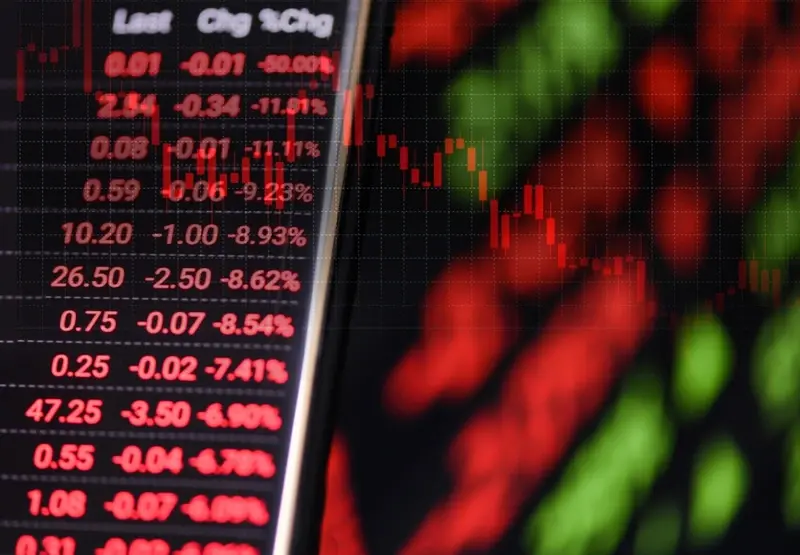
Stock prices in Europe followed Asian and US stocks into the red on Wednesday morning, as investors await several service PMIs from Europe, US trade balance data and an interest decision by the Bank of Canada.
The FTSE 100 index opened down 50.21 points, or 0.6%, at 8,248.25. The FTSE 250 was down 142.91 points, or 0.7%, at 20,665.83, and the AIM All-Share was down 4.34 points, or 0.6%, at 758.05.
The Cboe UK 100 was down 0.6% at 825.48, the Cboe UK 250 was down 0.6% at 18,207.46, and the Cboe Small Companies was unchanged at 16,950.08.
Local equities had a muted start, in part thanks to a poor performance for stocks across the pond.
‘September began on an ugly note, to say the least. The US equities tumbled after the latest ISM data showed a fifth month of contraction in the US manufacturing, and at accelerated pace. The latter revived the recession worries ahead of this week’s critical US jobs data, and sent the S&P500 more than 2% down. This was the worst sell-off since August 5, when a weak jobs data from the US had boosted the recession worries, the expectation of a 50 basis point cut from the Federal Reserve and resulted in an almost 10% sell-off of the S&P500,’ said Swissquote Bank’s Ipek Ozkardeskaya.
She added: ‘The slowing US growth and soft data boost the recession worries and rate cut expectations. The rate cut expectations favour a sector rotation from highly valued Big Tech toward the non-tech pockets of the market. But the expectation of a jumbo rate cut is bad for all stocks, regardless of their technology exposure.’
More locally, there were early reports on Wednesday that the new full state pension in the UK could rise by more than £400 per year. The Treasury’s internal working calculations, reportedly seen by the BBC, revealed the pension could be boosted as a result of April’s triple lock.
Changes would take the full state pension to around £12,000 in 2025 to 2026, following a £900 increase in 2023. Pre-2016 retirees who may be eligible for the secondary state pension could see a £300 per year increase.
Any decision on a pension increase will be made by Secretary of State Liz Kendall ahead of October’s budget. Chancellor Rachel Reeves on Monday reaffirmed the government’s backing of the triple lock until the end of this parliament.
In European equities on Wednesday, the CAC 40 in Paris was down 0.9%, while the DAX 40 in Frankfurt was down 1.0%.
The pound was quoted at $1.3111 early on Wednesday in London, up compared to $1.3089 at the equities close on Tuesday. The euro stood at $1.1054, up against $1.1037. Against the yen, the dollar was trading at JP¥144.91, down compared to JP¥145.85.
In the FTSE 100, Segro lost 1.5%.
The London-based property investment company has reached agreement on a takeover offer for Tritax EuroBox, which will be implemented via a scheme of arrangement.
Tritax EuroBox investors will receive 0.0765 new Segro shares per Tritax share, as well as a 1.25 euro cents quarterly dividend. The deal values Tritax EuroBox at £1.10 billion, including net debt.
M&G was also in the red, down 0.5%.
The London-based investment manager posted a half-year pretax loss of £57 million, swung from profit of £101 million a year prior. Adjusted operating pretax profit came down to £375 million from £390 million, while the loss from short-term valuations in investment returns was £284 million, widened from £177 million.
In the FTSE 250, Hilton Food Group lost 5.2%.
The group posted interim pretax profit of £25.4 million, up from £11.3 million a year prior. Revenue was down 8.4% to £1.94 billion from £2.12 billion, but up 1.0% on a constant currency basis. Looking ahead, Hilton said it was ‘well-positioned and continues to trade in line with expectations for the full year’.
The food packaging group separately named AG Barr’s Mark Allen as its new chair designate, with effect from October 1. Allen will then become chair of Hilton Food’s board on January 1.
Boosting the index was Balanced Commercial Property Trust, up 10%.
The group has agreed to a cash takeover offer from Starwood Funds, according to which Starwood will pay 96.00 pence per share in cash for the firm. This offer is at a 22% premium to Balanced Commercial Property Trust’s price in April, and at an 8.7% discount to Balanced Commercial Property Trust’s net asset value on June 30.
Elsewhere, Dalata lost 7.2%.
It reported half-year pretax profit of €41.9 million, down from €50.4 million a year prior. Revenue rose to €302.3 million from €284.8 million, while revenue per available room was €110.77 from €109.41. Hotel occupancy dipped slightly to 77.6% from 78.4% year-on-year, while average room rate rose slightly to €142.67 from €139.50.
According to the hotel operator, demand from corporate and international visitors remained strong, but there has been a softening from more cost conscious domestic customers, with trade lower than expected in regional Ireland and in the UK in July and August.
In Asia on Wednesday, the Nikkei 225 index in Tokyo was down 4.2%. In China, the Shanghai Composite was down 0.7%, while the Hang Seng index in Hong Kong was down 1.3%. The S&P/ASX 200 in Sydney closed down 1.9%.
According to data from S&P Global, China’s service economy continued to expand in August.
The seasonally adjusted headline Caixin China general services business activity index edged down to 51.6 in August from 52.1 in July. The composite output index remained unchanged at 51.2 in August.
Meanwhile, Japan’s business activity continued to be healthy last month.
The au Jibun Bank Japan services business activity index remained unchanged at 53.7 in August, while the au Jibun Bank composite PMI output index improved to 52.9 in August from 52.5 in July, indicating growth accelerated.
Down under, Australia’s ailing economy recorded another quarter of near moribund growth.
Second-quarter gross domestic product expanded just 0.2% from the previous three months, reported the Australian Bureau of Statistics. The economy has grown a paltry 1.0% in the past year, with per capita GDP falling 1.5%.
Australia’s services activity expansion sped up in August. The seasonally adjusted Judo Bank Australia services PMI business activity index improved to 52.5 in August from 50.4 in July, indicating growth accelerated. The Judo Bank Australia composite output index edged to 51.7 in August from 49.9 in July.
In the US on Tuesday, Wall Street ended lower, with the Dow Jones Industrial Average down 1.5%, the S&P 500 down 2.1% and the Nasdaq Composite down 3.3%.
Brent oil was quoted at $73.13 a barrel early in London on Wednesday, down from $74.19 late Tuesday.
Gold was quoted at $2,486.40 an ounce, higher against $2,482.65.
Still to come on Wednesday’s economic calendar, there is composite PMI data from the eurozone, France, Germany, and the UK. There is also an interest rate decision from Canada, and trade balance and factory orders from the US.
Copyright 2024 Alliance News Ltd. All Rights Reserved.




